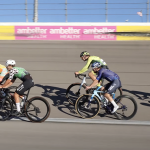Reebok International net income for the second quarter ended June 30, 2004 was $22 million, or $.35 per diluted share, as compared to net income of $26 million, or $.41 per diluted share in the second quarter of 2003. The second quarter 2004 results contain a one-time after tax earnings charge of $7 million or $.11 per diluted share resulting from the previously announced early redemption of the Company's $250 million 4.25% Convertible Debentures. Excluding the effect of this one-time charge, 2004 earnings per diluted share was $.46, an increase of 12% from the prior year's second quarter.
Net sales for the 2004 second quarter increased to $814 million, as compared with 2003's second quarter sales of $803 million. Foreign currency exchange rate fluctuations favorably impacted sales comparisons. On a constant dollar basis, second quarter sales declined by approximately 1% as compared with the prior year's second quarter sales. For the Reebok Brand, worldwide sales in the 2004 second quarter increased 2% to $681 million compared to 2003's second quarter sales of $666 million.
The Company's international sales of Reebok branded products amounted to $312 million in the quarter, an increase of 9% over 2003's second quarter sales. Reebok's U.S. footwear sales in the second quarter of 2004 were $279 million, an increase of 3% when compared with 2003's second quarter U.S. footwear sales of $272 million.
Sales for the Company's other brands; Rockport; Ralph Lauren Footwear and The Greg Norman Collection were $133 million in the second quarter of 2004, compared with 2003's second quarter sales of $136 million.
The Company reported that its total worldwide backlog of open customer orders scheduled for delivery from July 2004 through December 2004 for the Reebok Brand increased 3% from the prior year's comparable amount. On a constant dollar basis, overall backlog for the Reebok Brand was approximately the same as the prior year's amount.
Paul Fireman, the Company's Chairman and Chief Executive Officer said, “Our second quarter results were consistent with our plans for the quarter. Our goal during 2004 is to focus our attention on growing quality market share for both footwear and apparel, especially in those segments of retail that support and enhance the essence of our brands. During the quarter and the first half of the year, we invested behind several initiatives to support these goals. We are investing in new systems, various supply chain initiatives and we are streamlining our product development processes. We believe the changes we are making will enable us to become more efficient and effective and will free up the resources necessary to support both our long-term investments and our current year financial objectives. We expect this will be an ongoing process. We are committed to continually look for new opportunities to improve our operating efficiencies. We do, however, expect to see some return from the investments we are making beginning in the second half of this year.”
“A key focus of the Reebok Brand is to build upon the success of our three product and marketing platforms: Rbk, Performance and Classic. These three platforms are helping to position the Brand as both aspirational and relevant to our targeted consumer segments,” Fireman noted.
“During the quarter Rbk footwear product sales in the U.S. endorsed by music icons 50 Cent and Jay-Z increased by over 350%. For the quarter overall Rbk footwear sales were less than 15% of our U.S. footwear business and less than 5% of our business outside the U.S. Internationally we are beginning to roll out Rbk to several key markets and the initial results have been very positive. We are optimistic about the long-term growth prospects for Rbk both domestically and internationally. By Spring 2005 our Rbk products will encompass multiple categories such as basketball, running, training, tennis, and boots. And, we intend to introduce distinct product collections for both men and women. Our initial feedback on the most recent launches of our G-Unit and S. Carter Collection products during the back-to-school period has been positive. In August we will launch a new collection of footwear inspired by music producer Pharrell Williams, that will add another exciting element to our Rbk platform. Later this year in the holiday season we plan to launch, with great anticipation, the G-Unit boot,” Fireman continued.
“We believe that one of the largest long-term growth opportunities for the Company is our Performance area. This is partially due to the valuable partnerships we have entered into with all four major professional sports leagues in the United States and the benefit we derive from understanding the product requirements of so many of the world's best athletes and designing and developing products to meet or exceed their expectations,” Fireman said. “In addition, the recent emphasis we have placed on becoming a brand of choice to the serious runner continues to generate positive results. Our Premier Series of running products is performing well in specialty running shops around the world. When we launched Premier running just 18 months ago it was our intention to initially validate our performance credentials in running specialty shops and then broaden the product offerings into other channels of distribution in order to reach more consumers and generate greater revenue. In Spring 2005, we plan to introduce three new running product collections called Vision, Aztek and Essentials. These products will be segmented by different channels of retail distribution such as athletic specialty, sporting goods and the department store channel, and will carry suggested retail prices ranging from $50 to $80.”
“During the quarter and for the first six months of 2004 sales of Reebok Classic footwear product increased approximately 20% as compared with 2003. The increases are coming from both the Classic original products as well as Classic derivative products that are more fashion forward. We believe that our strategy to evolve the mix of Classic product into new collections that are more contemporary and appeal to a younger consumer is working. And, as a result, the average selling price of Reebok Classic product is rising,” Fireman added.
“U.S. apparel sales for the Reebok Brand decreased by 18% in the second quarter to $90 million. The decline is in line with our previous guidance that sales of U.S. apparel may decline in the second and third quarter of 2004. During the first half of 2004 sales of both NFL and NBA products increased double digits. We continue to make progress with the introduction of new sports licensing product categories such as footwear. Sales of licensed footwear products more than doubled in the first half of 2004 as compared with the prior year's comparable period. In order to support our growing sports licensed apparel business we needed to implement a new, state-of-the-art warehouse and manufacturing system for our Indianapolis facility. Since the second quarter is the lowest volume quarter for this location we decided to shut down the facility for approximately four weeks beginning in April 2004 in order to implement the new systems. As a result of the shut down, we lost some sales in the second quarter but we are planning to ship much of this product during the third quarter. Our ability to achieve this will depend upon how quickly the shipments from this facility return to normal capacity. Reebok branded apparel sales were down significantly for the quarter and for the first half of the year. Part of the decline is the result of our strategic decision to reposition this product line for future growth and to exit certain unprofitable product groups. However, this has generally been a difficult year for core branded apparel products. We continue to believe that the U.S. branded apparel category is a significant long-term growth opportunity for the Company. Our goal is to generate revenue growth and profit improvement from U.S. branded apparel during 2005,” Fireman continued.
The Company reported that its gross margin for the second quarter of 2004 was 39.1%, an improvement of 160 basis points when compared with the gross margin of 37.5% in the second quarter of 2003. “For the quarter, the margin improvement came from both footwear and apparel in the U.S. and internationally. The improvement in the Company's international margins had the effect of improving the Company's overall gross margins by approximately 20 basis points in the quarter,” Fireman said.
Worldwide inventories at June 30, 2004 totaled $539 million compared to $476 million a year ago. Accounts receivable at June 30, 2004 was $623 million compared to $541 million a year ago. “The inventory and accounts receivable increase is primarily related to our acquisition of The Hockey Company which was effective on June 30, 2004 and to the effects of currency. Excluding the impact of The Hockey Company and currency, our inventory declined approximately $16 million or about 3%, and our accounts receivable declined about $5 million or 1%,” Fireman noted.
“Based on our results for the first half of 2004 and the current outlook, we are on target to achieve our earnings goal for the year, excluding the one-time charge for the early extinguishment of debt. I believe that our strategies are sound and I am confident that our management team will continue to execute in a focused and effective way in the future,” Fireman concluded.
Reebok International Ltd.
Financial Summary
Three months ended June 30,
2004 2003
Net sales $813,565,000 $802,576,000
Net income (1) $21,752,000 $25,605,000
Average basic shares 59,652,000 59,097,000
Average diluted shares (2) 64,960,000 67,442,000
Basic earnings per share (1) $0.36 $0.43
Diluted earnings per share (1) $0.35 $0.41
Six months ended June 30,
2004 2003
Net sales $1,645,425,000 $1,600,856,000
Net income (1) $62,857,000 $66,441,000
Average basic shares 59,666,000 59,486,000
Average diluted shares (2) 66,689,000 67,752,000
Basic earnings per share (1) $1.05 $1.12
Diluted earnings per share (1) $0.98 $1.04
Reebok International Ltd
THREE MONTHS ENDED JUNE 30,
(Amounts in millions except per share data)
CONDENSED CONSOLIDATED STATEMENTS OF OPERATIONS 2004 2003
----------------------------------------------------- ------- -------
Net sales $813.6 $802.6
Cost of sales 495.8 502.0
------- -------
Gross Margin 317.8 300.6
% of Net sales 39.1% 37.5%
Selling, general and administrative expenses 271.1 260.4
% of Net sales 33.3% 32.4%
Interest expense, net 1.6 4.0
Other expenses, net 3.0 (1.1)
Loss on extinguishment of debt (1) 10.2
------- -------
Income before income taxes and minority interest 31.9 37.3
% of Net sales 3.9% 4.6%
Income taxes 9.7 11.3
------- -------
Income before minority interest 22.2 26.0
Minority interest 0.4 0.4
------- -------
Net income $21.8 $25.6
======= =======
Basic earnings per share $0.36 $0.43
Diluted earnings per share (2) $0.35 $0.41
Average basic shares 59,652 59,097
Average diluted shares(2) 64,960 67,442













